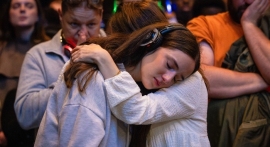
New survey shows that a growing share of Americans view religion as a positive influence on society, alongside an uptick in the number who believe religion is gaining public prominence.
The Pew Research Center on Monday released findings drawn from two nationally representative samples: 9,544 adults polled Feb. 3–9 and 8,937 adults surveyed May 5–11.
In a report summarizing the trend, Pew Research Associate Chip Rotolo noted, “Americans’ views about religion in public life are shifting. From February 2024 to February 2025, there was a sharp rise in the share of U.S. adults who say religion is gaining influence in American life.”
“While this remains a minority view, it is increasingly held by adults across several demographic groups — with gains of at least 10 percentage points among Democrats and Republicans, adults in every age category and in most large religious groups.”
Overall, 59% of respondents held a net positive view of religion, including 42% who said religion’s influence is decreasing and consider that a negative trend. Meanwhile, 17% who said it is increasing and regard that as beneficial.
The proportion expressing a net positive opinion of religion rose from 49% in September 2022 to 57% in February 2024 and 59% in 2025.
Though the 2025 share with a net negative stance (20%) was slightly above 2024’s 19%, it remained well below the 26% recorded in 2022.
Another 16% said “religion’s influence is declining,” while also stating that “this doesn't make a difference.” Meanwhile, the combined “net neutral or unclear” group fell to 21%, down from 25% in 2022 and 23% in 2024.
By religious affiliation, white Evangelical Protestants were most likely to report a net positive outlook at 92%, with majorities of Black Protestants (75%), Catholics (71%), and white non-Evangelical Protestants (67%) expressing similarly favorable views.
In contrast, Jewish respondents were split: a 38% plurality registered a net negative view of religion, 36% a net positive view, and 26% a “net neutral or unclear view.”
Large majorities of atheists (79%) and smaller majorities of agnostics (59%) reported net negative views, while among those identifying as “nothing in particular,” a 38% plurality held a “net neutral or unclear view,” with 33% net positive and 29% net negative.
Partisan differences persisted, as 78% of Republicans and Republican leaners had a net positive view of religion, whereas Democrats were more divided at 40% positive, 35% negative, and 24% “net neutral or unclear.”
Age also correlated with attitudes: net positive views of religion were reported by 71% of those 65 and older, 68% of those 50–64, 52% of adults 30–49, and 46% of those 18–29.
Perceptions of religion’s cultural sway shifted markedly: 68% said religion is losing influence in the U.S. and 31% said it is gaining, compared to 2024 when 80% saw it losing ground and 18% the opposite — showing a pronounced change.



















